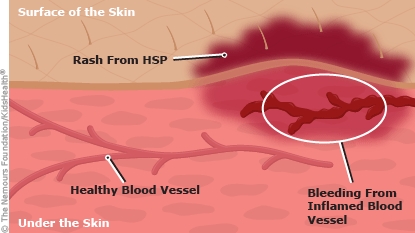Most people with Henoch-Schönlein purpura get better in a few weeks and do not have long-term problems.


In Henoch-Schönlein purpura (HSP), small blood vessels in the body become swollen and irritated. These inflamed blood vessels in the skin can leak red blood cells, causing purpura, which is a raised, reddish-purple rash that looks like bruises. The rash usually appears on the legs and buttocks, but can also show up on other parts of the body.
Vessels in the joints, intestines, kidneys, and other parts of the body also can swell and leak. People with HSP may have joint pain, joint swelling, stomach pain, nausea, vomiting, diarrhea, bloody urine (pee) or stool (poop), fever, or headache. Boys may have pain and swelling in the scrotum. In some children, HSP can lead to more serious intestine or kidney problems.
HSP is not contagious. Most children with HSP fully recover within a month and have no long-term problems. Some kids with HSP get it more than once.



Your child:

Your child: